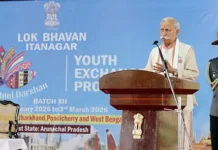[ Banika Kri ]
The integrity of college student politics has slowly lost the meaning of being a students’ space and also the meaning of politics itself. This is very visible in the government colleges and universities of Arunachal Pradesh.
Most of the students who attend government colleges belong to economically weak families with a small percentage who come from more financially secure families. Even with these class differences, all students enter college with the hope of accessing education, gaining confidence and taking part in activities that colleges provide.
Student union election is one such activity that gives students the chance to experience democratic practice. Leaders are elected by students through voting, but here the question emerges: How democratic is this democracy today? Not all students have the confidence to put their names forward for election, especially for the powerful post of general secretary. The ‘outside’political culture of money has entered the campus and has shaped the minds of students. This is an example of political socialisation, where students learn the values and practices of the larger society and copy the same in campus. The normalisation of money in elections has travelled into the college environment.
In several cases, the amount of money a candidate spends directly decides their chance of winning. When elections turn into a display of economic power, it discourages financially weaker students, and participation becomes based on class privilege rather than leadership ability. Meanwhile, some rich students feel motivated to contest because they already know how politics works: money is power. This does not mean all candidates are rich. But the pattern is observable: the post of general secretary (GS) is mostly occupied by students who belong to privileged backgrounds. Poor students who may have real leadership quality and a genuine interest to serve the college become invisible and excluded.
Thus, an educational institution, which should be inclusive, becomes a space where class reproduction happens; meaning the same class hierarchy of the outside society gets repeated inside the campus also. In this way the student body itself gets divided into hierarchy: those who can afford to participate and hold power vs those who must silently remain in the audience and only vote.
The spending during election is high. Thousands of rupees are used by candidates. Most GS candidates are not earning on their own; they depend on their family or on some other figure who is willing to fund them. So, what chance do poor students really have? Their chance is low not because they are less capable, but because the voter mindset itself has changed. Not all but many voters think: “I will vote for whoever gives me more money.” This is not only individual influence; there are also small blocs or groups of students, usually 15-20 members, who can be bought together by one candidate. These groups then actively campaign for that candidate and convince others also to vote for the same person.
In such a scenario, leadership quality and manifesto have very little importance. What becomes important is money. This shows how economic capital is directly converted into political capital. When this becomes a pattern year after year, superiority and inferiority between student groups becomes naturalised and normalised, which again becomes a form of symbolic hierarchy.
In this financial competition a poor student cannot fairly compete. Rich students hold both economic resources and social capital (their networks and connections). These advantages help them secure status inside the college. Politics becomes a market transaction where money replaces ideas. The poor student may want to bring positive changes in the college, but the structure silently tells them: “You cannot participate unless you can pay.” This is social exclusion operating inside an educational institution.
The Supreme Court of India directs us to adhere to a code of conduct that upholds democratic values in election. It further directs that the recommendations of the Lyngdoh Committee (2006) be implemented strictly by all government colleges and universities. The committee clearly states that the expenditure limit for each candidate must not exceed Rs 5,000. Further, within two weeks after the results are declared, every candidate is required to submit a full and audited statement of their election expenses to the university concerned or college authority. These authorities must then publish the audited statements within two days, so that students are able to review them freely. If any candidate violates these financial regulations, their election may be cancelled.
Candidates are also forbidden from using money from any source other than voluntary contributions from the student community, to ensure that political party funding does not enter campus politics. In the context of current student elections in government educational institutions of Arunachal, it appears that the enforcement of these recommendations remains weak. To address this, colleges and universities have an important role to play. Institutions must ensure stricter implementation to protect the credibility of student elections.
At the same time, strict implementation alone is not enough. Election behaviour must also be monitored closely. Sometimes, the written account of expenses for auditing itself can be misleading, because candidates may hide unrecorded expenditures, such as cash used to buy or influence votes. To address this, institutions may appoint neutral student observers to quietly monitor and report financial malpractice during elections. Any student from the college can report financial malpractice to the authorities anonymously with evidence, apart from a neutral student observer. If the reporter’s identity is disclosed to the authorities, it must be kept strictly confidential. This helps keep candidates and their supporters in check. Any candidate found using money to influence voting must be immediately disqualified. Only when such actions are taken seriously can college elections become fair, democratic and meaningful again, where every student, rich or poor, can see themselves as a potential leader instead of being automatically placed into a hierarchy based on money. (The contributor has completed her master’s degree in sociology from the University of Madras, Chennai)

